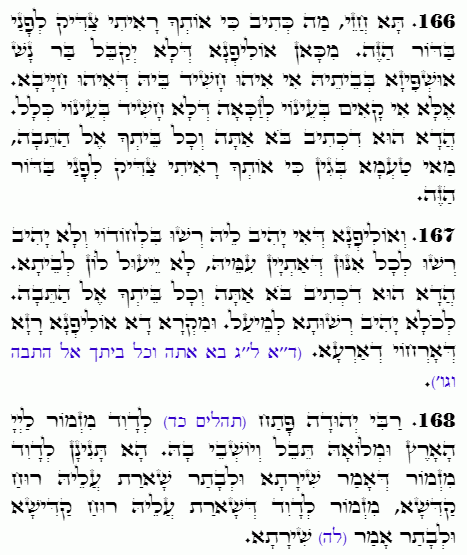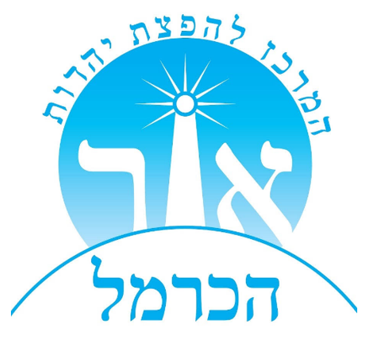Daily Zohar # 4693 – Noach – A Psalm of Ruach Hakodesh
Daily Zohar 4693
 Preview (opens in a new tab)
Preview (opens in a new tab)
Hebrew translation:
167. וְלָמַדְנוּ, שֶׁאִם נָתַן לוֹ רְשׁוּת לְבַדּוֹ וְלֹא נָתַן רְשׁוּת לְכָל אוֹתָם שֶׁבָּאִים עִמּוֹ, לֹא יַכְנִיס אוֹתָם לַבַּיִת. זֶהוּ שֶׁכָּתוּב בֹּא אַתָּה וְכָל בֵּיתְךָ אֶל הַתֵּבָה. לְכֻלָּם נָתַן רְשׁוּת לְהִכָּנֵס. וּמִפָּסוּק הַזֶּה לָמַדְנוּ סוֹד דֶּרֶךְ אֶרֶץ. [ד”א בֹּא אַתָּה וְכֹל בֵּיתְךָ אֶל הַתֵּבָה וְגוֹ’].
168. רַבִּי יְהוּדָה פָּתַח, (תהלים כד) לְדָוִד מִזְמוֹר לַה’ הָאָרֶץ וּמְלוֹאָהּ תֵּבֵל וְיֹשְׁבֵי בָהּ. הֲרֵי שָׁנִינוּ, לְדָוִד מִזְמוֹר – שֶׁאָמַר שִׁירָה וְאַחַר כָּךְ שָׁרְתָה עָלָיו רוּחַ הַקֹּדֶשׁ. מִזְמוֹר לְדָוִד – שֶׁשָּׁרְתָה עָלָיו רוּחַ הַקֹּדֶשׁ וְאַחַר כָּךְ אָמַר שִׁירָה.
.
Zohar Noach
Continued from previous DZ
#166
Come and see what is written: “כִּי אֹתְךָ רָאִיתִי צַדִּיק לְפָנַי” “For I have seen you as righteous” (Genesis 7:1). From here we learn that a person should not invite a guest into his house if he suspects the guest of being wicked; instead, he should only invite someone he regards as righteous and does not suspect of wrongdoing. This is why it says, “בֹּא אַתָּה וְכֹל בֵּיתְךָ אֶל הַתֵּבָה” “Come, you and all your household, into the Ark.” And what is the reason? Because “כִּי אֹתְךָ רָאִיתִי צַדִּיק לְפָנַי בַּדּוֹר הַזֶּה” “I have seen you as righteous before Me in this generation.”
#167
We have learned that if permission is given to the guest alone but not to everyone who accompanies the guest, they should not be allowed to enter the house. As it is written, “Come, you and all your household, into the Ark” (Genesis 7:1), permission was given for all of them to enter. From this verse, we learn the secret of the order of proper conduct.
Notes:
This passage highlights the importance of clarity and respect in hospitality, teaching that explicit permission should be granted to each individual when inviting them into one’s space. The Zohar uses Noah’s experience as a model of derech eretz (proper conduct), emphasizing that order and respect are essential in relationships and hospitality. This principle reinforces the sanctity of spaces where permission and boundaries ensure harmony, respect, and an environment that reflects divine order in human interactions.
#168
Rabbi Yehuda opened with the verse, “לְדָוִד מִזְמוֹר לַה’ הָאָרֶץ וּמְלוֹאָהּ תֵּבֵל וְיֹשְׁבֵי בָהּ” “A Psalm of David. The earth is YHVH’s and all that fills it” (Psalms 24:1). We have learned that wherever it is written “A Psalm of David” (לְדָוִד מִזְמוֹר), it means that David first said the song, and then the Divine Spirit rested upon him. But when it is written “מִזְמוֹר לְדָוִד” “A Psalm for David,” it indicates that first “רוּחַ הַקֹּדֶשׁ” the Divine Spirit rested upon him, and afterward he sang the song.
Notes:
The Zohar’s distinction between “A Psalm of David” and “A Psalm for David” reveals a nuanced understanding of spiritual inspiration, showing that connection with Hashem can be initiated either by human effort or by divine grace. This insight underscores the importance of preparing oneself through prayer and being open to unexpected moments of divine inspiration. The passage reflects the multifaceted nature of spiritual experiences, where sometimes the human soul reaches out to God, and other times God reaches down to inspire the soul, both leading to a harmonious expression of devotion and praise.
Friday would be a good day to make a ** Donation, especially if you didn’t donate in the past week. Giving on Friday, which is an aspect of Yessod, expands the vessel for the Light and honor of Shabbat.
** Your donation doesn’t have to be given to the same place every week. You can alternate or split your donation among those who benefit you spiritually.
 Support – Ohr HaCarmel Yeshiva
Support – Ohr HaCarmel Yeshiva
Tap here: Ohr HaCarmel Donation Page to make your contribution and make a spiritual connection to Israel.
The Yeshiva Ohr HaCarmel (which means the Light of the Carmel) is on top of Mount Carmel, where the prophet Elijah’s prayers were answered.

 Previous: Noach
Previous: Noach

